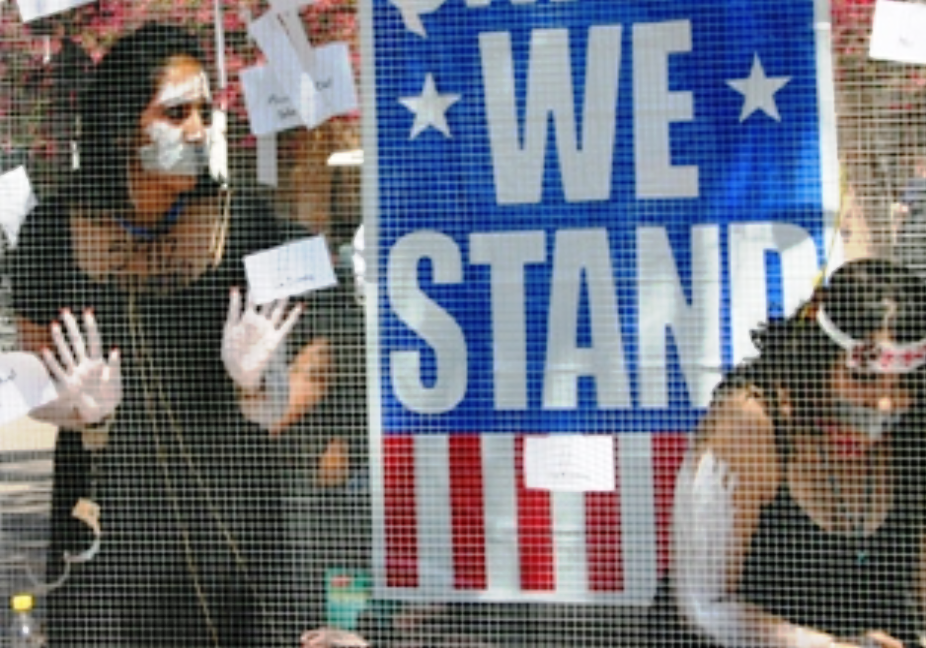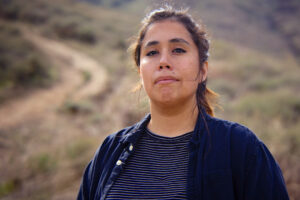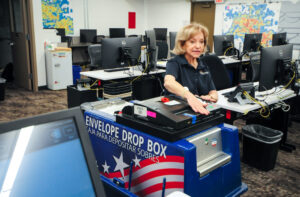(Phoenix, Arizona) –– In the context of Arizona’s legislation and a crackdown on undocumented immigration, Teatro Nopalero emerges as a developing alternative to tackle immigration issues and other social problems in Maricopa County. Barriozona Magazine interviewed Silvia Rodriguez, the group’s leader and performer.
How was Teatro Nopalero formed?
Silvia Rodriguez: In 2006, when the human rights marches began in Arizona, students united against Prop 300, and in an effort to educate the community about all the issues that were going on with immigration, I decided to use theater. I have had experience with doing Theater of the Oppressed and invited my friends to join me. We never wanted to become anything professional or a big deal. We just wanted to educate other students and voters on what was happening. Somehow, I became the director of the group, since I was the one with the most theater experience. People in other places began to ask us to do theater at their events and soon we were named “El Teatro Nopalero.” It began as a joke, however, soon after that we were known for what we were doing, and that became our official name. Many of the original members such as Dulce Juarez have continued to act, and work with other theater companies. Others started their own groups, but theater became a part of all of our lives.
In essence, what is Teatro Nopalero trying to accomplish?
To create social change and consciousness through theater. We want to work with the community and find solutions to the problems we have. We want to empower others to use their talents to help others. One of the main motivators for our group is fighting for justice, particularly with the Dream Act, and immigration reform. But all of our plays have positive messages, dealing with family issues, drugs, education, relationships, discrimination, violence, and all sorts of messages about oppression and liberation.
What are some of the plays your group has presented?
We have been presenting theater for social change since 2006, when Prop 300 was on the ballot; that is how the group began. Some are Cuando el mojado se seca, La tripa no sabe de leyes ni fronteras, Aliens in the cage, Las comadres y el sheriff, Al otro lado de la tortilla, Cholas going to college, and others. We have performed at schools, churches, community centers; we run workshops at national conferences on how to use street theater for social change.
Who writes and directs the plays?
Most of the time we meet as a group and develop everything together: the costumes, the lines, and the stories. At times I have crazy ideas like (the play) “Aliens in the Cage” and the group members are bravely willing to help me develop them, and present them no matter how controversial they might be.
What is the focus of your plays?
All of the plays have a message for social change, and has strong roots in Theater of the Oppressed. Many times the message is contentious and political, which helps the goal of the group. The goal is to create consciousness through the art of theater.
What are the main challenges and obstacles for your group?
The main challenge is that we all are students, have jobs and families, so getting together many times is hard to do. Other challenges for some of the group members is that many times our work is presented in an underground sort of way, because of the controversy and heavy criticism we have towards the sheriff and the leaders of this state; we do some of our work anonymously.
Does your group receive funding/donations or is it based on volunteer work?
We have done all of our performances and community workshops for free. We never charge people, we believe that teatro should be free, and because it is used to create consciousness, we believe that everyone should have access to it. But we do accept and welcome any donations that will help us in our efforts to bring theater to the community.
What feedback have you received from the community?
The community loves our theater, we always try to use humor and incorporate as many characters from the barrio, so people could identify with it. Such as the cholos y cholas, the comadres, the college students, eloteros (corn vendors) and other characters.
What makes your group different than others that do similar work?
Most of our work is improvised; we do not have scripts, we don’t focus on doing main stage work. We are not in this to become famous; we are in it because we know the powerful tool that theater is to create and promote freedom. To educate the community, to transmit messages of hope and change. We believe in the power of the people, and draw strength from our roots and pre-colonial cultura. We challenge the status quo and we are not afraid to question. But most of all we do theater from a place of love
What are some of the Teatro Nopalero short and long-term goals?
To be more active as a theater group, to do park performances this summer where people of all backgrounds and children who have nothing to do during the summer can come and learn, have fun, and be inspired.
How can the community support Teatro Nopalero?
By asking us to go perform for them, and telling others about our group, by joining and becoming involved.
Related video: Social Theater in Phoenix from Teatro Nopalero
© 2010 – 2022, Eduardo Barraza. All rights reserved.





